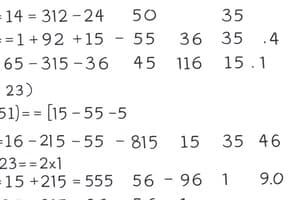Podcast
Questions and Answers
What is the Absolute Value?
What is the Absolute Value?
- The product of a number and itself
- The sum of two numbers
- The distance of a number from zero on a number line (correct)
- The inverse of a number
What does the Absolute Value Curve represent?
What does the Absolute Value Curve represent?
The graph of f(x) = b, which is a V-shaped curve
What is the Additive Identity?
What is the Additive Identity?
The number zero
What is the Additive Inverse?
What is the Additive Inverse?
What does the Associative Property state?
What does the Associative Property state?
What is the definition of a Base in mathematics?
What is the definition of a Base in mathematics?
What does the Closure Property indicate?
What does the Closure Property indicate?
What is a Coefficient?
What is a Coefficient?
What is a Common Denominator?
What is a Common Denominator?
What is the Communtative Property?
What is the Communtative Property?
What is the Complement of a Set?
What is the Complement of a Set?
What is a Complex Fraction?
What is a Complex Fraction?
What constitutes a Complex Number?
What constitutes a Complex Number?
What is a Consistent System of Linear Equations?
What is a Consistent System of Linear Equations?
What is considered a Constant?
What is considered a Constant?
What does it mean to Cube a number?
What does it mean to Cube a number?
What is a Cube Root?
What is a Cube Root?
Two sets are a __________ if they have no elements in common.
Two sets are a __________ if they have no elements in common.
What does the Distributive Property state?
What does the Distributive Property state?
What is an Equation?
What is an Equation?
What defines an Even number?
What defines an Even number?
What is an Exponent?
What is an Exponent?
What is an Expression in mathematics?
What is an Expression in mathematics?
What is a Finite Set?
What is a Finite Set?
A __________ of an expression creates a root.
A __________ of an expression creates a root.
What is an Imaginary Number?
What is an Imaginary Number?
What is an Imaginary Root?
What is an Imaginary Root?
What defines an Improper Fraction?
What defines an Improper Fraction?
What is an Index in mathematics?
What is an Index in mathematics?
What is an Inequality?
What is an Inequality?
What is an Infinite Set?
What is an Infinite Set?
What is an Integer?
What is an Integer?
What is the Intercept form of a Linear Equation?
What is the Intercept form of a Linear Equation?
What is the Intersection of Sets?
What is the Intersection of Sets?
What is Interval Notation?
What is Interval Notation?
What defines an Irrational Number?
What defines an Irrational Number?
What are Like Terms?
What are Like Terms?
What is a Linear Equation?
What is a Linear Equation?
What is a Linear Inequality?
What is a Linear Inequality?
Flashcards are hidden until you start studying
Study Notes
Algebraic Concepts
- Absolute Value: Measures the distance from zero on a number line; always non-negative.
- Absolute Value Curve: Represents the function f(x) = b; characterized by a V-shape.
- Additive Identity: The number zero; adding zero to any number yields that number.
- Additive Inverse: The negative counterpart of a number; when added to the number results in zero.
- Associative Property: The grouping of three or more numbers in addition or multiplication does not affect the outcome.
- Base: A number that is multiplied by itself a specific number of times.
- Closure Property: Any two real numbers summed or multiplied will result in another real number.
- Coefficient: A numerical factor multiplied by variables within a term.
- Common Denominator: A shared multiple by which all denominators in a set can be divided.
- Commutative Property: Order of addition or multiplication does not change the result.
Set Theory and Functions
- Complement of a Set: Notated as A', includes all elements of the universal set not in A.
- Complex Fraction: A fraction that contains fractions in its numerator or denominator.
- Complex Number: Formulated as a + bi, where both a and b are real numbers.
- Consistent System of Linear Equations: Identifiable by having a single solution.
- Constant: A fixed value that does not change regardless of other variables.
Exponents and Roots
- Cube: Raising a number or expression to the third power.
- Cube Root: The number that results in a specified value when cubed.
- Disjoint Sets: Two sets with no common elements.
- Distributive Property: Indicates that a(b ± c) = ab ± ac for any real numbers a, b, and c.
- Equation: An expression showing two algebraic forms are equal, divided by an equal sign.
Number Types
- Even Numbers: Integers divisible by 2 without remainder.
- Exponent: Indicates the number of times a base is multiplied by itself.
- Expression: A combination of terms without an equal sign.
- Finite Set: A set that contains a countable number of elements.
- Fractional Exponent: Introduces roots into an expression.
Advanced Numbers and Properties
- Imaginary Number: Any number represented as bi, where b is a real number and i equals the square root of -1.
- Imaginary Root: A solution to a quadratic equation that includes an imaginary component.
- Improper Fraction: A fraction where the numerator is equal to or larger than the denominator.
- Index: Refers to the root in a radical expression.
- Inequality: A mathematical statement indicating one expression is less than, greater than, or not equal to another.
Set Characteristics
- Infinite Set: A set that comprises an uncountable number of elements.
- Integer: Includes all natural numbers, their negative counterparts, and zero.
- Intercept Form of Linear Equation: Structured as x/a + y/b = 1, where a and b represent the x and y intercepts, respectively.
- Intersection of Sets: The common elements present in both sets A and B.
- Interval Notation: A method for expressing inequalities with brackets indicating inclusive endpoints and parentheses indicating exclusive endpoints.
Miscellaneous
- Irrational Number: Cannot be expressed as a ratio of integers; examples include e, Pi, and square roots of non-square numbers.
- Like Terms: Terms that can be combined due to having identical variables and exponents.
- Linear Equation: Formulated as ax + by = c, where a, b, and c are constants, ensuring a and b aren't simultaneously zero.
- Linear Inequality: Represents conditions in forms like ax + by > c or ax + by < c, indicating relationships of greater or lesser value among points.
Studying That Suits You
Use AI to generate personalized quizzes and flashcards to suit your learning preferences.




